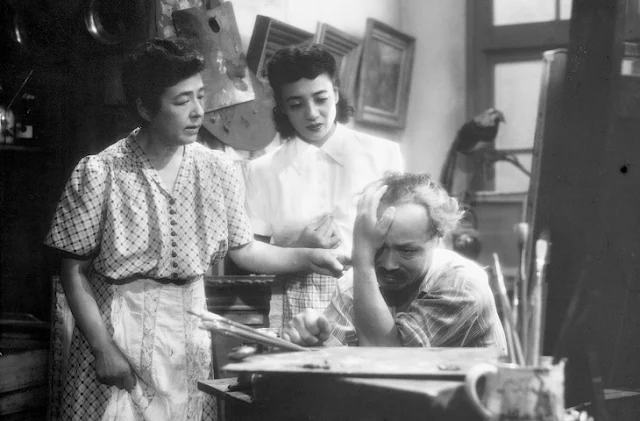 |
| Chieko Higashiyama, Kuniko Miyake, and Ichiro Sugai in The Portrait |
Kaneko: Eitaro Ozawa
Tamai: Kamatari Fujiwara
Nomura, the Artist: Ichiro Sugai
The Artist's Wife: Chieko Higashiyama
Kumiko, the Daughter-in-Law: Kuniko Miyake
Yoko, the Artist's Daughter: Yoko Katsuragi
Midori's Friend: Mitsuko Miura
Nakajima, Yoko's Boyfriend: Keiji Sada
Ichiro, the Artist's Son: Toru Abe
Director: Keisuke Kinoshita
Screenplay: Akira Kurosawa
Cinematography: Hiroshi Kusuda
Production design: Motoji Kojima
Film editing: Yoshi Sugihara
Music: Chuji Kinoshita
Keisuke Kinoshita's The Portrait deserves to be a little better known, if only because its screenplay is by Akira Kurosawa. Not that it's a masterpiece, or even a particularly felicitous example of Kurosawa's screenwriting, but it's one of the better films of the enormously prolific and sometimes misguided Kinoshita. IMDb, oddly, gives only the names of the cast members, not indicating what roles they play, which can be something of a challenge to those of us who aren't completely familiar with Japanese actors. Fortunately, I was able to track down a cast list and a useful summary on French Wikipedia. At the core of the film is an old trope: the portrait that reveals the truth. In this case, it reminds Midori, the mistress of real-estate hustler Kaneko, of her innocent past, causing her to break off their relationship. Kaneko has entered into partnership with Tamai to buy a rather rundown and ill-planned house, make some renovations, and flip it for double the price. The problem is the tenants, an artist named Nomura and his family. Kaneko is reluctant to evict them outright -- this guy is in real estate? -- so he concocts a plan: He will move Midori, who has somewhat of a temper, into the upstairs room of the house, and she'll prove such a torment to Nomura and his family that they'll be glad to leave. But things start to go awry almost immediately: The family think that Midori is Kuneko's daughter instead of his mistress. Naturally, she's somewhat flattered by this misconception. She softens even more when Nomura wants to paint her portrait, and falls completely when the family downstairs prove to be kind and affectionate people. Watching Yoko, the daughter, dance with her boyfriend under a full moon, and then be joined by Nomura and his wife, Midori starts to turn against Kaneko. But then even Kaneko is softened by the tenants and abandons his scheme. This is typical movie sentimentality, a fault Kinoshita (and sometimes Kurosawa) was often guilty of, but there is a bittersweet touch to the ending when Midori, having seen her portrait on display at a museum, walks away into an unknown future.

